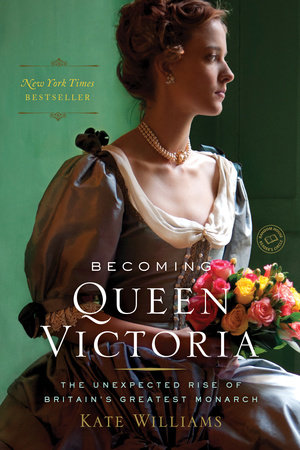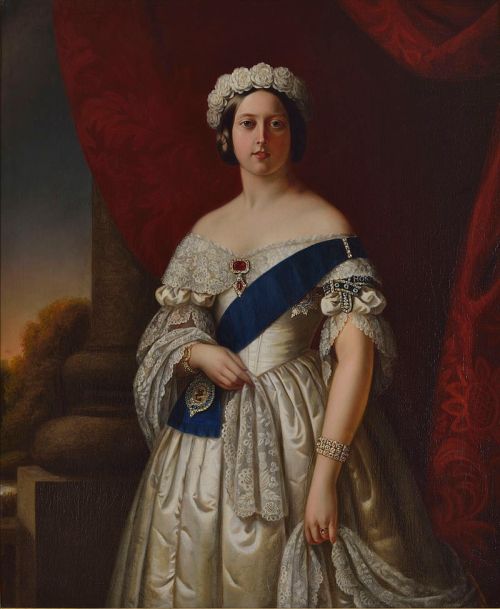The Victorian Era was a pivotal moment in time for British culture, and as we all know, Queen Victoria, was at the center of this changing world. Her ascension to the throne of England followed the tumultuous time of revolutionary democracy in America and France, the beginning of the Industrial Revolution, population growth, as well as uprising and unrest. Victoria herself inherited her rule from a lineage of failed kings: George III who lost the American colonies and eventually his sanity, George IV who lost his relationship with his wife as well as his daughter Charlotte who died in childbirth, and William IV who was unable to produce a surviving legitimate heir. Into this disrupted world and dysfunctional family, Victoria rose as queen at the age of eighteen, a young woman leading her world into a new era of progress.

Last year, Ballantine Books released a new paperback edition of Kate Williams’ 2008 history Becoming Queen Victoria: The Unexpected Rise of Britain’s Greatest Monarch. With the feel of a smart historical novel, this biography of Victoria takes a broad view of historical context while simultaneously incorporating intricate behind-the-scenes details of Victoria’s family and personal life. It’s a fascinating read, especially if you (like me) having been watching the recent rendition of Victoria’s life on PBS Masterpiece and love the intrigue and drama of the royal family.
Interesting enough, instead of jumping right to the birth of Victoria, the book begins with a lengthy section detailing Victoria’s predecessors in the Hanoverian line, specifically the Princess Charlotte, who would have been queen if she had not died in childbirth. As Williams writes, Charlotte was Britain’s “perfect princess: sweet, reserved, possessed of a kind heart, and entirely unlike her self-centered father” (54). England was ready for a queen after too many terrible kings. Alas, Charlotte was only a shadow of the future queen.
Aside from Charlotte, the Hanover family was dysfunctional: full of alcoholism, affairs, unhappy arranged marriages, wasteful spending, and massive debt. Not to mention King George III, who eventually became so mentally ill that he had to be locked up in the last years of his life. George III’s many children had failed the dynasty, marrying against the will of the state and producing only illegitimate children. Until the birth of Charlotte, of course. And when Charlotte married and became pregnant, it seemed like the line would definitely continue. But tragedy struck, and the line was cut off.
This is the family background Williams sets up in the first 150 pages. At first this seemed strange, given that I expected the book to be solely about Victoria. But reading through the drama and tragedy of the Hanovers gave the desired effect: it was refreshing to dip into the section about Victoria. Before, the text submerged me in too many names and too many tragedies, but then, Victoria was born and the air cleared, and I felt relief just as the British people must have felt as their monarchy was finally stabilized over the rest of the 19th century.
The rest of the book then dives into Victoria’s life from infancy, concentrating on her young adulthood and early reign. Born into such a family, she definitely had an unusual upbringing: “The little girl was treated like a queen from the very beginning. A footman in splendid livery accompanied her wherever she went, and servants bowed subserviently when she trotted along the corridor” (174). From the moment she was born, her destiny was laid out for her in every way.
Unlike some histories I’ve read, this book does not get bogged down in dry facts. Never losing sight of her research, Williams provides beautiful visual details about people and setting and history, filling in the gaps when necessary: “She went to the robing room, where she donned a long red mantle lined with ermine . . . she walked, dazzled, into the abbey. There, in the interior that had been newly decorated with crimson and gold hangings and tapestries, the floors covered with oriental carpets . . . The queen herself looked charming. Lord Melbourne declared her floating on a silver cloud, a vision perhaps intensified by the quantities of laudanum he had consumed” (299).
But Williams doesn’t rely on primary sources and narrative alone: she incorporates poetry from Shelley and Byron, detailed descriptions of political cartoons from the time, as well as diary entries and letters from Victoria and her counterparts. These with the paintings and images in the center of the book combine to lend a complex look at Victoria’s world and what she was up against.
Historical Importance
Why study Queen Victoria anyway? Is it just to revel in more sedately British intrigue? Or to dream about a splendid royal life? I would argue that understanding the beginnings of Victoria, not only help us to understand the life of this queen, but also give us a look at an important moment in world history.
Reading Victoria’s story, I couldn’t help but meditate on the irony of it all. In the midst of a dysfunctional, directionless family, Victoria is born, coming to rule England as well as raise a seemingly happy family of nine children. However, the irony doesn’t end there. We think of the Victorians as prudish, restricting women to domestic spheres, yet Victoria as a woman was arguably the most influential leader of her time. I can’t help wonder what she truly thought about women’s rights (perhaps this would make an interesting deeper study). Also, Victoria is well-known as one of Britain’s greatest monarchs, yet under her reign, the British Empire expanded across the globe, colonizing and destroying many non-Western cultures, leading to war and conflict that continues today in our post-colonial time.
Studying Victoria’s place in this broader history, then, is important. Perhaps by understanding a little more about the time and family in which she was born gives a better idea of who she was as a woman and queen, helping us understand the state of our current world a little better.
About the Author
Writer and historian Kate Williams studied at Oxford and writes about world-changing leaders and royalty. Check out her website here!
Thanks to Ballantine Books and Penguin Random House for providing a copy of the book for review!






